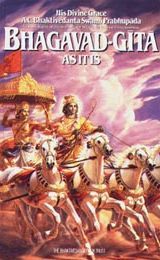To receive little snippets of nectar like this on a daily basis subscribe
HERE: or If you want to introduce anyone else in reading Srila Prabhupada
Nectars, please send their eMail addresses to mailto:krpamaya_gauranga@hotmail.com
Listen to the entire lecture on-line:
http://prabhupadaradio.com/M3U/Gita/m3u/GT170.m3u
or receive in mailbox and Subscribe HERE:
mailto:lectures-subscribe@prabhupadavani.org
Sravanam kirtanam at:
http://www.PrabhupadaVani.org
© 2001 The Bhaktivedanta Book Trust International. Used with permission.


SRILA PRABHUPADA'S QUOTE OF THE DAY
"To feel separation from the Spiritual Master
or Krishna is very good position. That means one who is in pure love with
Krishna and His Representative, Spiritual Master, he thinks always of Them.
And this thinking process is Krishna consciousness. If we can think always
of Krishna even in separation, that is Krishna Consciousness. And in the
absolute platform, there is no difference of separation and meeting. The
separation is also meeting, rather in separation one relishes the loving
relationship more tasty. So don't be disappointed that you are separated
from me, I am always thinking of you how you are making progress there."
.
(Srila Prabhupada letter, October 21, 1968)
Sign-up to receive these quote HERE:
mailto:haribol@pacific.net.sg

Bhaktivedanta Vedabase Network ...
http://vedabase.net/


The Scientific - Mathematical
Proof for God's existence:
http://geocities.com/sector114

http://robot-hosting.com/php/login_nicholas.html
user name = guest
password = guest
(Collection of philosophical and mathematical proofs
for existence of God can be found in this site.)

Scientifically Philosophical Books for the layman
 ...
... ...
... ...
...
Click on any of these books to read more about them and where to get
a copy
or contact your local temple for purchases
sample of Life
comes from Life HERE.pdf

Lotus Imprints - Preserving Prabhupada's Legacy - The
Publishing House of Hari Sauri dasa
http://www.lotusimprints.com/

Quotes from Shastra - scriptures
View using Balaram font
The following is from Srila Bhaktivinoda Thakura in
his SRI HARI KALPA LATIKA,chapter one.
15
kim ca --
tad-dasa hara-narada-prabhrtayah ko ‘ham varakah sisuh
papas ceti hriya mukunda-bhajana-tyagam vrtha makrthah
sarveso ‘pi durasado ‘pi karuna-sindhuh subandhuh
satam
bhaktyaiva svapacan apiha vasagah svenanugrhnati sah
TRANSLATION
O human beings, do not feel ashamed and give up the
service of Sri Krsna, thinking that great personalities like Lord Brahma
and Lord Siva are His servants, so how will I, an insignificant, sinful
person, become eligible to worship Him? Although He is the Lord of everyone
and rarely attained, He is an ocean of mercy and the friend of the devotees.
He is controlled only by devotional service, and through His devotees,
He bestows mercy even upon the dog-eaters.
16
na vedair nagamair yogair na tapobhir na karmabhih
bhaktyaiva kevalam grahyo yogi-mrgyah parat parah
TRANSLATION
He is never obtained through the study of the Vedas
or literatures in pursuance of the Vedic version, mystic yoga, austerities,
or fruitive activities. Rather, the Supreme Personality of Godhead,
who is the object of the yogis' meditation, is understood only by devotional
service.
17
tatha hi
sarva-dharma-vihino‘pi nadhita-nigamagamah
lebhe yad-bhakti-matrena dhruvah sarvottamam padam
TRANSLATION
Still, the great devotee Dhruva attained the highest
abode of the Lord simply by devotional service, even though he had not
practiced religious principles or studied the Vedic literatures.
18
sakama-matya bhajatam atad-vidam
bhakta-priyah kama-nivartakam nrnam
datte ghanananda-dugham padambujam
pita midasvadi-sisoh sitam iva
TRANSLATION
When a child eats clay his father takes the clay away
and gives him sweets. Similarly the Supreme Lord's lotus feet take lust
away and give spiritual bliss to ambitious devotees who are ignorant
of His glories. He is always affectionate to His devotees.
19
duscestita ye ‘pi aravindanabham
kvacid bhajante jana-ranjanartham
tathapi te tasya padam labhante
pritya bhajantah kim u sadhu-silah
TRANSLATION
Sinful persons who seldom worship Lord Sri Hari, and
do so only to please common people, also attain His lotus feet. What to
speak of the benefit received by saintly devotees who worship Him with
love.
20
TEXT
kamena para-pidabhir yo dambhenapi sevitah
tarayaty eva tan sarvan ko dayalur atah parah
TRANSLATION
Who is more merciful than Him? He delivers His servants
even if they serve Him with material desires, pride, or with a desire to
harass others.
21
avihita-sukrto ‘pi yo vidhatte
salila-dalair api tat-pade saparyam
tam anu sakala-dharmikaira labhyam
nija-padam eva da dati bhakta-bandhuh
TRANSLATION
If one, without performing any pious activities, simply
worships His lotus feet with water and tulasi leaves, Lord Sri Hari, who
is the friend of the devotees, awards His lotus feet to such a person.
His lotus feet are rarely attained by persons who are expert in performing
religious activities.
22
sukrta-sata-juso ‘pi yogino ‘pi
sriyam anusevayato ‘pi bhakti-hinan
na bhajati bhajatam satam adhinah
kim iti krpalum amum bhajen na lokah
TRANSLATION
The Lord does not give His mercy to the yogis, or
rich persons who are devoid of devotional service. He is controlled by
the love of His devotees. Therefore, why will the human beings not serve
such a merciful Lord?
23
dharman asesan api yo vihayabhajed ananyo hari-pada-padmam
dattva padam murdhni sudharmikanam sa eva tad-dhama
sukhad upaiti
TRANSLATION
One who abandons all religious duties and simply serves
the lotus feet of Lord Hari with full attention, can climb to the abode
of Lord Hari by stepping on the heads of the most pious people.
24-25
yasya bhakti-pradipo hi sada snehena dipitah
nihsesam nasayaty eva karma-dhvanta-samuccayam
bhava-davanalair dagdhan kas tratum saktiman bhavet
rte dina-daya sindhum tam ananda-sudhambudhim
TRANSLATION
The light from His oil lamp of affection continuously
illuminates one's devotional service and completely destroys the darkness
of ignorance. Who other than Lord Sri Hari, who is the ocean of mercy and
nectarean bliss, will deliver persons who are burnt by the fire of material
existence?
26
hari-pada-bhajanecchur indriyaugham
dhrti-matiman vijayate durjayarim
sama-dama-niyamair yamaih svadharmair
nahi paravan sukha-sadhane samarthah
TRANSLATION
Persons who are patient, intelligent, and desiring
to worship the lotus feet of Lord Hari easily defeat the senses, which
are like unconquerable enemies. On the other hand, persons who are controlled
by their senses cannot obtain any happiness even by peacefulness, self-control,
austerity, or by following the principles of varnasrama-dharma.
27
hari-pada-bhajane pathi pravrtto
nijam api karma vivarjayet pravrttam
anudinam anusilayen nivrttam
na bhavati yavad ihesvara-prakasah
TRANSLATION
Persons engaged on the path of worshiping Lord Hari
should give up fruitive activities prescribed for their particular varna
and asrama. They should continue to regularly perform activities without
any material desire until they fully realize the Supreme Lord.
28
kim castu krsna-mahima-tatparayanasyapi mahima
katham apivaktum na sakyata ity aha --
sa eva virah sa hi sastra-veda-vit
sa eva dhanyah sukrtah sa eva hi
sa eva laksmya svayam eva mrgyate
sa uttamo yo hari bhaktim asritah
TRANSLATION
What to speak of describing Lord Krsna's glories,
even the glories of His devotees cannot be fully described. In this regard
the author says:
One who has accepted the process of devotional service
to Lord Hari is glorious, most pious, a hero, the knower of all the sastras,
the best of all people, and personally searched after by Laksmidevi.

The following Sections are from Sri Gaudiya Kantahara
Both Men and Women Should Avoid Family
Attachment
15.19
tvak-çmaçru-roma-nakha-keça-pinaddham
antar
mäàsästhi-rakta-kåmi-viö-kapha-pitta-vätam
jévac-chavaà bhajati
känta-matir vimüòhä
yä te padäbja-makarandam
ajighraté stré
The stupid woman who has not
savored the aroma of the nectar of Your lotus feet will become the lover
of a "man" a live corpse made of flesh, blood, bones, stool, bile, germs
and air covered with skin, hair, beards, and mustaches. (Bhäg. 10.60.45)
Enjoyment of Conjugal Pleasures in
Household Life is Condemned
15.20
ye mäà bhajanti dämpatye
tapasä vrata-caryayä
kämätmäno 'pavargeçaà
mohitä mama mäyayä
[In condemnation of materialistic
devotees, the Lord said] Those who worship Me the giver of liberation in
order to enjoy conjugal happiness, who perform all kinds of penance and
sacrifice to that end, are fools deluded by sensual pleasure and ensnared
by the illusions of mäyä. (Bhäg. 10.60.52)
The Purpose of Household Life
15.21
adhanä api te dhanyäù
sädhavo gåha-medhinaù
yad-gåhä hy arha-varyämbu-tåëa-bhüméçvarävaräù
[Pëthu Mahäräja
told the four Kumäras] A person who is not very rich and who is attached
to family life becomes highly glorified when saintly persons are present
in his home. The master and servants engaged in offering the exalted visitors
water, a sitting place and paraphernalia for reception are glorified, and
the home itself is glorified. (Bhäg. 4.22.11)
The Unholy Household
15.22
vyälälaya-drumä vai
teñv ariktäkhila-sampadaù
yad-gåhäs tértha-pädéya-pädatértha-vivarjitäù
On the other hand, even though
full of all opulence and material property, any householder's house where
the devotees of the Lord are never allowed to come in, and where there
is no water for washing their feet, is to be considered a tree in which
venomous serpents live. (Bhäg. 4.22.12)
The Duty of Vänaprasthas
15.23
vänaprasthäçrama-padeñv
abhékñëaà bhaikñyam äcaret
saàsidhyaty äçv
asammohaù çuddha-sattvaù çiländhasä
A vänaprastha should live
by begging. He may accept food prepared from grains left behind in the
fields and markets. By such a practice, he will become purified, free from
delusion, and spiritually perfect. (Bhäg. 11.18.25)
Homes are in Different Modes
15.24
vanaà tu sättviko väso
grämo räjasa ucyate
tämasaà dyüta-sadanaà
man-niketaà tu nirguëam
In order to attain pure devotional
service, one's faith, residence, eating, and activities should all be pure.
From the mode of goodness, one can develop to the mode of pure goodness;
therefore it is important to live in a place which is pure. The following
is a description of residences in the different modes of nature: A hut
in the forest is in the mode of goodness, an apartment in the city is in
the mode of passion, and a room in a gambling den is in the mode of ignorance.
(Bhäg. 11.25.25)
Karma-sannyäsa, Jïäna-sannyäsa,
and Tridaëòé-sannyäsa
15.25
jïäna-sannyäsinaù
kecid-veda-sannyäsino 'pare
karma-sannyäsi-nas-tvanye trividhäù
parikétitäù
There are three kinds of sannyäsa:
karma-sannyäsa, jïäna-sannyäsa, and vedic-sannyäsa.
(Padma Puräëa, Svarga Khaëòa)
A Dhéra Sannyäsé
15.26
gata-svärtham imaà dehaà
virakto mukta-bandhanaù
avijïäta-gatir jahyät
sa vai dhéra udähåtaù
A sannyäsé is
known as dhéra, or undisturbed, sober, and a self-realized soul
when he goes to an unknown, remote place and freed from all obligations
and false ego, quits his material body when it has become useless. (Bhäg.
1.13.26)
A Narottama Sannyäsé
15.27
yaù svakät parato veha
jäta-nirveda ätmavän
hådi kåtvä harià
gehät pravrajet sa narottamaù
A narottama, or first class
human being, is one who awakens and understands, either by himself or from
others, the falsity and misery of this material world and thus leaves home
and depends fully on the Personality of Godhead residing within the heart.
(Bhäg. 1.13.27)
Prohibition Against Karma-sannyäsa
in Kali-yuga
15.28
açvamedhaà gavälambhaà
sannyäsaà pala-paitåikam
devareëa sutotpattià
kalau païca vivarjayet
In this age of Kali, the following
five kinds of karma-käëòa practices are forbidden: offering
a horse in sacrifice, offering a cow in sacrifice, accepting sannyäsa,
offering oblations of flesh to the forefathers, and a man begetting children
in his brother's wife. (Malamäsattatva-dhëta, Brahma Vaivarta
Puräëa, Kåñëa-janma-khaëòa 4.115.113)
The Meaning of the Word Tridaëòé
15.29
vägdaòo'tha mano-daoòaù
käya-daëòa-stathaiva ca
yasyaite nihitä-buddhau trédaëòéti
sa ucyate
One who accepts in his mind
the rod of chastisement for his speech, mind is known as a tridaëòé
one who has accepted the threefold rod of chastisement. (Manu-saàhitä
12.10)
15.30
damanaà daëòaà
yasya väo-manaù-käyänäà daoòäù
niñiddhäbhidhänäù sat-saokalpa-pratiñiddha-vyäpära-vyäpära-tyägena
buddäva-vasthitäù sa tridaëòéty-ucyate
na tu daëòa-traya-dhäraëa-mätreëa
The word daëòa
means "punishment." One who "punishes" the speech, mind, and actions means
one who gives up attachment for material sense enjoyment and who accepts
what is favorable for the truth and rejects what is unfavorable for perfection.
Such a person is called a tridaëòé. It is not that anyone
who carries around three sticks can be called a tridaëòé.
(Manu-saàhitä 12.10, Kalukka Bhaööa commentary on
the above verse from Manu-saàhitä).
Rüpa Gosvämé's Definition
of Tridaëòé
15.31
väco vegaà manasäh
krodha-vagaà
jihvä-vegam udaropastha-vegam
etän vegän yo viñaheta
dhéraù
sarväm apémäà
påthivéà sa çiñyät
One who can control the forces
of speech, mind, anger, the tongue, the belly, and the genitals is known
as a Gosvämé and is qualified to accept disciples all over
the world. (Upadeçämåta 1)
Tridaëòé-sannyäsa
is Mentioned in the Ancient Vedas
15.32
tatra paramahaàsä näma
saàvartakäruëi-çvetaketu-durväsa-åbhü-nidägha-jaòa-bharata
dattätreya-raivataka-
prabhåtayo'vyakta liogä
avyaktäcärä, anunmattä unmattavad äcarantastridaëòam
kamaëòallum çikyam pätraà jalapavitraà
çikhäà yajïopavétaà cetyetat sarvaà
bhuù svähetyapsu parityajyätmänam-anvicchet
In addition to the previously
mentioned paramahaàsas are these famous wandering sannyäsés
(parivrajakas), Samvartaka, Aruåinandana, Audàlaka, Çvetaketu,
Durväsà, ëbhu, Nidàgha, Jaòa Bharata, Dattàtreya,
Raivata, and so on. They are all paramahaàsas; none of them wear
the outward signs of varëäçrama the çikhä
and sacred thread of a brähmaëa. They are not mad but behave
like madmen. The paramahaàsa, saying the mantra bhü-svähä
(I offer you to the earth) leaves aside all external paraphernalia of the
renounced order, including the tridanòa, staff, the waterpot, the
begging bowl made from a gourd, the belt made of straw, the purifying cup
for water, the tuft of hair, the sacred thread, and dedicates himself solely
to following the order of the bona fide guru and the inner direction of
the Paramätmä. (Jäbälopanisad 6.1)
Çrémad Bhägavatam
Mentions Tridaëòa-sannyäsa
15.33
kecit tri-veëuà jagåhur
eke pätraà kamaëòalum
péöhaà caike
'kña-sütraà ca kanthäà céräëi
kecana
pradäya ca punas täni
darçitäny ädadur muneù
Some took away his tridaëòa,
some stole his begging bowl, and others snatched away his waterpot. Some
of them pulled away his äsana, others harassed him by taking his japa-mälä,
his beads. Others grabbed at his clothing and took away his cloth. (Bhäg.
11.23.34)
The Tridaëòé Attains
Perfection According to the Manu-saàhitä
15.34
tridaëòam-etan-nikñipya
sarva-bhüteñu mänavaù
käma-krodhau tu saàyamya
tataù siddhià niyacchati
One who disciplines his mind,
speech, and body and controls his lust and anger towards other living beings
and thus gives up these bad qualities is a tridaëòé
and attains liberation. (Manu-saàhitä 12.11)
The Häréta-saàhitä
Glorifies Tridaëòa-sannyäsa
15.35
tridaëòa-bhåd-yo
hi påthak samäcarecchanaiù çanair-yastu bahir-mukhäkñaù
san-mucya saàsära-samasta-bandhanät sa yäti viñëoramåtätmanaù
padam
The tridaëòi sannyäsa
gradually withdraws his senses from any connection with sight, sound, taste,
smell, etc., and becomes indifferent. His mind is gradually freed from
any trace of involvement with material enjoyment, and his behavior becomes
similarly pure. Such a sannyäsé has freed himself from family
bondage and, becoming liberated, he tastes the nectar of spiritual bliss
at the lotus feet of Çré Viñëu. (Häréta-saàhitä
6.23)
Çrédhara Svämé
Mentions Tridaëòa-sannyäsa
in his Bhägavatam Commentary
15.36
"evaà bahüdakädi
dharmän uktvä paramahaàsa-dharmänäha jïäna-niñöha
iti särdhair-daçbhiù bahir-virakto mukmukñù
san jïäna-niñöhä vä mokñe'py anapekño
mad-bhakto vä sa saliogän
tridaëòädi-sahitän
äçramäàs-tad-dharmäàs-tyaktvä
tadäsaktià tyaktvä yathocitaà dharmaà cared
ity arthaù" punaräya
After explaining the duties
of other sannyäsés such as bahüdaka the duties of a paramahaàsa
are described in ten and a half verses begining with this one A paramhaàsa
may be one desiring liberation and thus fixed in knowledge or may be a
devotee who disregards even liberation. He should perform proper religious
duties without any attachment to material desires. He can give up all the
external symptoms of varëäçrama-dharma. He gives up the
äçrama duties means he gives up attachment to them and performs
them with no material motive. (Bhävärtha-dépikä commentary
on Bhäg. 11.18.28)
Çré Caitanya Mahäprabhu's
Opinion on the
Tridaëòé Verse
of Bhägavatam
15.37
prabhu kahe,—sädhu ei bhikñura
vacana
mukunda sevana-vrata kaila nirdhäraëa
parätma-niñöhä-mätra
veña-dhäraëa
mukunda-seväya haya saàsära-täraëa
sei veña kaila, ebe våndävana
giyä
kåñëa-niñevaëa
kari nibhåte vasiyä
Çré Caitanya
Mahäprabhu approved of the ekam samasthaya parätma-niïöham
verse on account of the determination of the mendicant sannyäsé
to engage in the service of Lord Mukunda. He gave his approval of this
verse, indicating that is was very good. The real purpose of accepting
sannyäsa is to dedicate oneself to the service of Mukunda. By serving
Mukunda, one can actually be liberated from the bondage of material existence.
After accepting the sannyäsa order, Çré Caitanya Mahäprabhu
decided to go to Vëådävana and engage Himself wholly and
solely in the service of Mukunda in a solitary place. (Cc. Madhya 3.7-9)
A Tridaëòi-sannyäsé
Keeps his Çikhä, Sacred Thread,
and Sannyäsé Dress
15.38
çékhé yajïopavété
syät tridaëòé sa-kamanòuluù
sa pavitraç ca käñäyé
gäyatréï ca japet sadä
A tridaëòé
sannyäsé keeps his çikhä as well as his sacred
thread after renunciation, He also carries a kamaëòalu. He
wears saffron cloth, and remaining fixed in purity, he chants the gäyatré
mantra and the japa of the holy name. (Skanda Puräëa, Süta
Saàhitä)
15.39
ekaväsä dvidväsätha
çikhé. yajïopavétavän
kamaëòalukaro vidväàs-tridaëòo
yäti tat-param
Wearing one or two pieces of
cloth, maintaining the tuft of hair, and continuing to wear the sacred
thread, with a waterpot in his hand, a learned sannyäsé, who
is the best of men, attains the Supreme Lord. (Padma Puräëa,
Svarga Khaëòa Ädi 13)
The Hundred and Eight Names of the
Tridaëòé-sannyäsés
15.40
térthäçramavanäraëya-giri-parvata-sägaräù
sarasvaté bhäraté
ca puré nämäni vai daça
gabhastinemir värähaù
kñamit-tåparamärthinau
turyäçramé niréhaç
ca tridaëòé-viñëu daivataù
bhikñur-yäyävaro
viñöho nyäsé-räbhasiko muniù
viñöhalalo mahävéro
mahattaro yathägataù
naiskarmya-paramädvaité
çuddhädvaité jitendriyaù
tapasvé yäcako nagno
raddhanté çuddhädvaité bhajanonmukhaù
sannyäsé maskaré
klänto niragnir-närasiàhakaù
auòalomi-mahäyogi-çruväk
bhavapäragaù
çramaëo'vahütaù
çäntas yathärho daëòi-keçavau
nyastaparégraho bhakti-säro'kñré
janärdanaù
urdhva manthi-tyakta-gåhäv-urdhvareto
yatoñöha-dhåk viraktodäsénau tyägé
siddhänté çrédharaù çikhé
bodhäyano trivikramjo govindo
madhusüdanaù
vaikhänaso yathäsvo vai
vämano paramahaàasakaù
näräyaëa-håñékesé
parivräjaka-maìgalau
mädhavo padmanäbhaç
cauòupako bhrämé vaiñëavaù
viñëu-dämodarau
svämé gosvämé paramogavaù
bhägavato hyakiïcanaù
santo niskiïcano yatih kñapaëko'viñaktaçcordhva
puëdro muëòi-sajjanay
nirviñayé harerjano
çrauté sädhu båhad-vraté
sthaviras-tat-paro paryaöakäcäryau
svatantradhéù
kathyante yatinämäni prathitäni
mahétale
añöhottara-çatäni
tu vaidikakhyäni täni hi
There are one hundred and eight
authorized Vedic names for sannyäsés, principle among which
are these ten: Tértha, äïräma, Vana, äraåya,
Giri, Parvata, Sàgara, Sarasvaté, Bhäraté, and
Puré. In addition there are Gabhastinemi, Väräha, Kñamità,
Paramärthé, Turyäçramé, Nirtha, Tridaëòé,
Viñëudevata, Bhiksu, Yäjävara, Viïöha,
Nyäsé, Räbhasika, Muni, Viïöhalala, Mahävéra,
Mahattara, Yathägata, Naiskarmya, Paramädvaité, Çuddhädvaité,
Jitendriya, Tapasvé, Yäcaka, Nagna, Raddhanté, Bhajanonmukha,
Sannyäsé, Maskaré, Klànta, Niragni, Närasiäha,
Auòalomé, Mahäyogé, Sruväka, Bhavapàraga,
Çramaåa, Avadhüta, Çänta, Yathärha,
Daëòé, Keçava, Nyataparigraha, Bhakti-sàra,
Akñaré, Janärdana, Urdhva-manthé, Tyakta-gëhä,
Urdhvareta, Yatoïöha-dhëk, Virakta, Udàséna,
Tyägé, Siddhänté,
Çrédhara, Çikhé, Bodhäyana, Trivikrama,
Govinda, Madhusüdana, Vaikhänasa, Yathäsva, Vämana,
Paramahaàsa, Näräyaëa, Håñikeça,
Parivräjaka, Maìgala, Mädhava, Padmanäbha, Auòupaka,
Bhrämi, Vaiñëava, Viñëu, Dämodara, Svämé,
Gosvämé, Parmagava, Bhägavata, Akiñcana, Santa,
Niskiñcana, Yati, Kñapaåako, Aviïakta, Urdhva-puëòro,
Muëòi, Sajjana.Nirviïayé, Harijana, Çrauté,
Sädhu, Bëhad-vraté, Sthavira, Tatpara, Paryaöaka,
Äcärya, and Svatantré. (Muktikopaniñad and Sättvata-saàhitä)
**
A Tridaëòé-sannyäsé
is Worshipable by all Açramas
15.41
devatä-pratimäà
dåñövä yatià caiva tridaëòinam
namaskäram na kuryäcced
upaväsena çuddhyati
One who does not offer obeisances
upon seeing gods and sannyäsés should fast all day for his
purification. (Ekädaçé-tattve trispåçaikädasé-prakaraëa-dhåta-småti-väkya)
A Paramahaàsa Vaiñëava
Surpasses all the Açramas
15.42
vaiñëavera bhakti ei
dekhäna säkñät
mahäçramé o vaiñëavere
kare daëòavat
sannyäsa-grahaëa kaile
hena dharma
täïra pitä äsi'
putrere kare namaskära
ata eva sannyäs-äçrama
sabära vanditä
"sannyäsé-sannyäsé"
namaskära se vihita
tathäpi äçrama-dharma
chäòi' vaiñëavere
çikñä-guru çré
kåñëa äpane namaskare
Seeing the great devotion of
a Vaiñëava, even those in the highest äçrama as
well as other devotees offer their obeisances. To one who has accepted
the order of sannyäsa, one must bow down as would a son to his father.
Everyone must bow down to a sannyäsé, and offer them respect,
saying, "O saintly one, O sannyäsé." Nevertheless, devotees
give up all concern for äçrama-dharma, and simply bow down
before their instructing guru and Kåñëa. (Cb. Antya 8.150-153)
Sarvabhauma Bhaööäcärya's
Example
15.43
särvabhauma balena, "äçrame
baòa tumi
çästramate tumi vandya,
upäsaka ämi"
Sarvabhauma said to Çré
Caitanya Mahäprabhu, [who appeared before him as a sannyäsé],
"Your äçrama is great. In the opinion of the çästra,
You are worshipable by one such as myself. (Cb. Antya 3.76)
Impersonalist Sannyäsés
are Condemned
15.44
sannyäsé haiyä
niravadhi "näräyaëa"
baliveka prema-bhakti-yoge anukñaëa
nä bujhiyä çaìkaräcäryera
abhipräya
bhakti chäòi mäthä
muòhäiyä duùkha päya
Sannyäsés always
say the name of Näräyaëa and worship him in prema-bhakti-yoga.
Not understanding the position of Näräyaëa, the followers
of Çaìkaräcärya give up the path of bhakti; such
fools attain only trouble and misery. (Cb. Antya 3.54,55)
taken from Gaudiya Kantahara Fifteenth Jewel Varnasharamdharma-tattwa

All pictures from Srimad Bhagavatam and Iskcon works - Copyright ©2005
The Bhaktivedanta Book Trust
International, on the web at .http://www.krishna.com/.
Used with permission.









![]()
![]()
![]()

![]()
![]()
![]()
![]()

![]()
![]()
![]()
![]()















